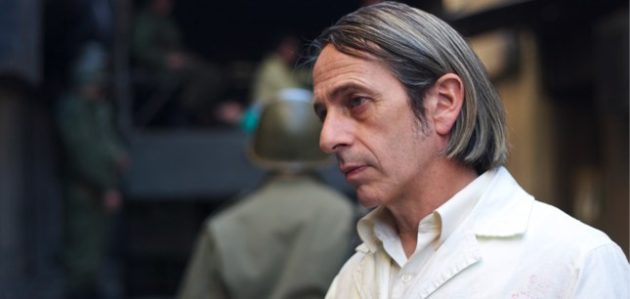REVIEW: Pablo Larraín's Post Mortem Feels Around for the Feeble Pulse of Love, or of a Country

In the States, at least, it may seem odd to make a bitterly funny movie about glum working people caught in the crossfire of political upheaval and state-sanctioned murder. But Pablo Larraín pulls it off with Post Mortem, a modest, mordant little drama set in 1973 Santiago, Chile, just as a military coup is spelling the end for democratically elected President Salvador Allende and setting the stage for the ascent of dictator Augusto Pinochet. If you were a Chilean citizen in the middle of all that, you probably wouldn’t be smiling much, and sure enough, Larrain’s protagonist here, a dour coroner’s assistant named Mario, sets the tone for the movie from the beginning: He’s a gaunt, living ghost, with lank, longish blonde-gray hair – he’d almost be hip, if only he had the energy.
As the movie opens, whatever problems Mario (Alfredo Castro) has seem to be of the personal sort. We see that he’s a regular at a local cabaret – the faded, crackled letters on its façade read “Bim Bam Bum” – and learn that he’s infatuated with one of the dancers, Nancy (Antonia Zegers), an enervated-looking girl with hollowed-out eyes that nonetheless know how to calculate. Nancy is Mario’s neighbor, although they meet for the first time when Mario steals backstage one day, just as Nancy is being fired by her boss for being too skinny. He introduces himself tentatively. “Hello, neighbor,” she responds, eyeing him as a cat surveys either a mouse or another cat – it’s hard to say which.
Mario and Nancy don’t exactly court – it appears she has a hunky Communist activist boyfriend, which presents something of an obstacle. But Mario's tenderness toward her is clear: He prepares plates of food for her, hoping to tempt her to eat. When her home is nearly destroyed in a mysterious raid – she’s not home at the time -- he enters the wreckage and rescues her injured dog. Nancy begs for his help in finding her father and younger brother, who have been missing since the raid. But the destruction of Nancy’s home is just one element of the violence and paranoia that’s erupting all over the city: Soldiers begin dumping anonymous bodies at the morgue where Mario works, demanding that autopsy protocol be waived; the corpses pile up daily in alarming numbers. Ultimately, those soldiers make him part of their ranks, bringing him in to assist in one extremely significant autopsy -- the man lying on the table isn’t just a human being, but a political turning point.
Post Mortem starts out at a crawl, but it gathers emotional momentum as it pushes forward. Larraín – director of the 2008 Tony Manero, in which Castro also starred – takes his time letting the story unfold, and most of the movie’s action is implied, framed by sparse lines of dialogue. Still, Larrain manages to do a lot with a little: The picture has a pale, worn-out look, as if the blood is being drained from it even as we watch – like the characters who populate it, it looks ready for some kind of rejuvenation that may never come. That’s particularly true of Castro’s Mario: Castro is a lanky figure who looks preternaturally careworn, in the David Strathairn/Peter Coyote mold. His Mario carries so much worry that it appears to have worn grooves into his bones. What’s happening to his country? Why does this woman, whom he loves so much, torture him with her indifference? And might one be a metaphor for the other? Post Mortem asks all those questions, in a way that’s more emotional than clinical. Rather than rushing to determine the cause of death – of love, or of a country -- it stubbornly keeps listening for a heartbeat, even though there may not be one.
Follow Stephanie Zacharek on Twitter.
Follow Movieline on Twitter.

Comments
As the movie opens, whatever problems Mario (Alfredo Castro) has seem to be of the personal sort.
nyc window cleaning
May I simply say what a comfort to find an individual who genuinely
understands what they're discussing online. You definitely realize how to
bring an issue to light and make it important.
A lot more people need to check this out and understand this side of the story.
I was surprised that you're not more popular since you certainly
possess the gift.
Neat blog! Is your theme custom made or did you download it from somewhere?
A theme like yours with a few simple adjustements would really make my blog stand out.
Please let me know where you got your design. Thanks a lot
This piece of writing gives clear idea in support
of the new viewers of blogging, that truly how to do blogging.
No matter if some one searches for his necessary thing, thus he/she
desires to be available that in detail, so that thing is maintained over
here.
After I initially left a comment I appear to have clicked the
-Notify me when new comments are added- checkbox and
now each time a comment is added I receive 4 emails with the exact same comment.
Is there a way you can remove me from that service?
Thanks a lot!
Have you ever thought about publishing an ebook or guest authoring on other sites?
I have a blog centered on the same information you discuss and would really like to have
you share some stories/information. I know my readers would enjoy
your work. If you are even remotely interested, feel free to shoot me an e mail.
Hey very nice site!! Guy .. Beautiful .. Amazing ..
I'll bookmark your site and take the feeds also? I am glad
to search out a lot of helpful information right here within the submit,
we want develop more techniques on this regard, thank you for sharing.
. . . . .